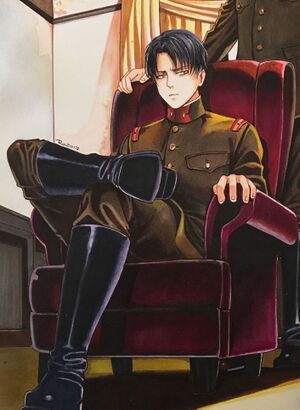Hồ Danh Sĩ Quốc
Imperial Marshal Marquis Hồ Danh Sĩ Quốc | |
|---|---|
 | |
| Born | 15 May 1909 Cam Ðoc, Tuyên Hóa Province, Quenmin |
| Died | 17 August 1948 (aged 39) Cao Khoát, Quenmin |
| Allegiance | |
| Service | |
| Rank | |
| Commands held | Joyonghea Imperial Expeditionary Front Imperial Remnant Army |
| Battles/wars | Invasion of Lorica Third Joyonghean-Quenminese War Post Second Europan War Crisis of 1945 |
| Children | Hồ Giang Thiên (great-grandson) |
Imperial Marshal Marquis Hồ Danh Sĩ Quốc (15 May 1909 – 17 August 1948) was a Quenminese general officer and noble who served in the Imperial Quenminese Army and the Imperial Remnant Army of the Bằc Lạnh Provisional Government. He commanded the Joyonghea Imperial Expeditionary Front during the Third Joyonghean-Quenminese War.
Graduating as a Lieutenant Colonel, he participated in the Invasion of Lorica where his strategic and commanding skills were noticed by the Imperial Quenminese Army General Staff. He was then granted command of the Joyonghean Imperial Expeditionary Front, a splinter force of the North Asianna Imperial Expeditionary Front, in order to invade Joyonghea. Quốc was able to force the Joyongheans to retreat to the Tongyeong Pocket, and occupy most of the mainland peninsula. He also sent one of his generals, Ân Quang Triệu, to secure Joyonghean Trabia, known at that time as Provisional State of Teulabia, in order to force the Holy Trabian Empire on their knees. His efforts were then stymied by the combined Joyonghean-Lucian Commonwealth forces, and he was eventually driven out of Joyonghea in 30 June 1945.
He was then employed by the Bằc Lạnh Provisional Government, created in West Jurchenia, to lead the Imperial Remnant Army to serve alongside the Communist Loricans who were offering amnesty for his and his acquaintances' crimes. During the Post Second Europan War Crisis of 1945, he employed guerilla tactics that helped to preserve his army and the Provisional Government for almost three years. He was finally captured in a village of Sharkhangai, and was brought to the International War Crimes Tribunal in Cao Khoát. He was then executed on 17 August 1948 in the capital.
His role in the Yeolcheon Purge remains in question. While his troops committed the massacre, his extent of his awareness was not made clear.